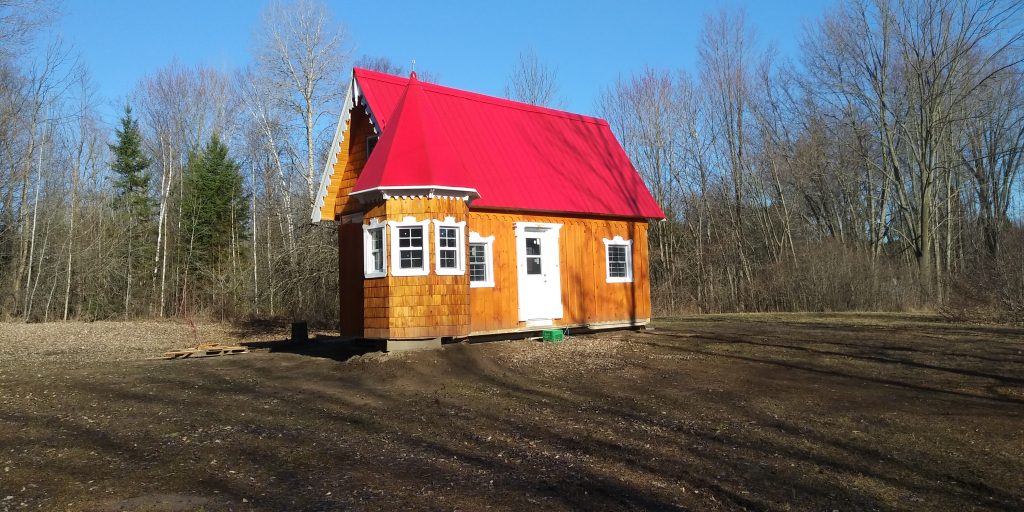 “Reduce the complexity of life by eliminating the needless wants of life, and the labors of life reduce themselves.” – Edwin Way Teale
“Reduce the complexity of life by eliminating the needless wants of life, and the labors of life reduce themselves.” – Edwin Way Teale
The idea, even urge, to create a sustainable community along with the construction of dwellings suitable for just that, in a location and on a property as proposed, is much more than just an idea.
The philosophy behind this is much deeper, and for you, gentle reader, to understand the motivation, one must step back and see the things as they are unfolding today, in present times, in our country and in our society.
As we all know and this must not be repeated here in detail, the way we live today is about to change on all levels and in all aspects. If we as a society are not taking the helm and change ourselves and our behaviour, in particular our relationship with Mother Earth and nature, the ways to come will be dictated by nature itself. It is evident already in many ways. At the point of this writing, only minuscule attempts of change are noticed. Much more in much shorter time is necessary, and it is necessary now.
Here is an excerpt of my book “Spiritual awareness – applied to daily life”: Every time I hear the word ‘growth’, I cringe. This word has been used as long as I can remember, and probably another couple of life times before me and is viewed as the synonym of prosperity. But not any longer. We have outgrown ourselves. If growth means prosperity, then the question comes up how are we to accomplish this? After all, growth means increased production and increased use of resources. What growth means in one area is destruction in another. This is the way growth does show itself today. It simply does not work in a world with finite resources. Add to that the discovery of our life style in far eastern countries, they too now want growth. They too now want increasingly come to the table and want not just crumbs, but fancy meals, as well. Compounded by an exploding population on earth, growth in future will not mean prosperity but demise.
After a 200 year long bonanza we all enjoyed through the discovery, use, and now, near depletion of (cheap) oil we are scrambling for alternatives-and this is only the beginning, but it has far reaching consequences.
 Forward looking people have said and are saying all along about those days to come, and in the very short and foreseeable future – however, those messages are largely ignored, since all expected changes are regarded to be a cut in the level of standard of living and nobody wants to hear about it, let alone, act about it. Then again, it does not have to be like that. As one notices, the so-called high level of standard of living may not be so desirable, after all. If you look around you might think that this level would produce nothing but happy people, but as you see, that this is simply not the case. Then, what is wrong?
Forward looking people have said and are saying all along about those days to come, and in the very short and foreseeable future – however, those messages are largely ignored, since all expected changes are regarded to be a cut in the level of standard of living and nobody wants to hear about it, let alone, act about it. Then again, it does not have to be like that. As one notices, the so-called high level of standard of living may not be so desirable, after all. If you look around you might think that this level would produce nothing but happy people, but as you see, that this is simply not the case. Then, what is wrong?
Perhaps we are indulged in too much of a high life style? For instance, our hunger for consumption and to buy constantly goods, made by people on the other side of the globe cheaply and inferior on purpose for continuing purchases, which does nothing but deplete existing resources, besides never ending frustrations of the purchaser. I notice that this is not conducive to being happy. Or our hunger of travelling, by any means, be it by car or plane, which is outstretching the ability of Mother earth to supply the energy needed to do that. Here, too, as in many other aspects, I notice that this is not conducive to being happy. If happiness and contentment are our ultimate goals, I believe we as a society are a long way from that. What to do? Where can we find contentment, if not in prosperity? One way which is shown to us clearly was Thoreau’s way of living in isolation, with virtually nothing.
Is this the future way? Perhaps it is, But then again, as in all extreme instances, it is not practicable for most of us, but it certainly would not be wrong to look in that direction. Uncluttering and simplifying our lives would go a long way towards contentment and happiness.
But even if some forward thinking individuals have recognized what is ahead, and are ready and willing to cut back, society and its matrix of established rules and regulations does not allow one to do just that. Even if we as individuals are inclined and ready to do away with excessiveness, or with rampant consumption, it is just not possible. Let’s look at rules and codes pertaining to housing only – in this context only this subject should be singled out. They are established in such a way that downsizing, or elimination of technical requirements, or even elimination of power supplied by power generating companies such as Hydro One in Ontario, is not legal to do, since this would infringe on existing rules. Even nature friendly ways of dealing with human waste disposal is not in alignment of existing regulations. The very way we build houses today is more than questionable from the viewpoint of sustainability, but deviating from established ways of building houses would ran contrary to existing building codes. Therefore, nothing will change, because these ways are established and here to stay – unless those rules are challenged as well.
For this reason, it is refreshing to see the newly development and wide acceptance of tiny homes. While the living units in themselves are certainly tiny and at the opposite end of the scale in terms of size compared to today’s large houses, they can only be attractive to minimalist thinking of a certain clientele. But the message it spreads out is to be welcomed. The message is that enough is enough, we must look at a different, a more sensible way of living. Living on less with less. Less living area, perhaps even extreme small, along with the proposed elimination of all outside provided services, thus self-sustained living, or as it is called today, off-grid. This life style is certainly not for everyone, perhaps not even suitable for permanent living, but it sends a clear message, and shows what the future may hold. For some people this movement may be the only way to ever acquire a roof on their own. Some of us may even, forced through circumstances, live on a much smaller scale than today. For this reason, it deserves to be introduced and looked into, despite the fact that so many of the existing regulations may or may not be met. If they are not, than it should not be a matter of being charged for non-compliance, but rather, the rules shall be challenged and must be revisited by higher powers in charge and amended to make those living units legal in all aspects. As an example, in our municipality the by-law governing minimum square footage of living space has been eliminated. This is a much welcomed move for everyone who intends to live in a small space, perhaps regarded as too small for many, yet, sufficient for others. And certainly more affordable.
 Viewed from this standpoint, the proposed community and the proposed abodes shall be seen as a model community of the future, and there will be certainly more to follow. Again, the wave of widely accepted tiny homes prove just that. Not known to many, there are now almost one thousand builders in the States producing tiny homes. Only a few short years ago the entire movement was regarded as a temporary fag like few other similar movements. The tiny homes and the associated goals are much higher and they are more sensible – and they are here to stay. Adorable Abodes is an example of the next step of this evolution, one step up from tiny homes, in that the units are a bit larger and not built on trailers, but still movable if need be. The land where the units are placed on will be offered for parking only, and no services are provided. The units themselves are built within the same mind-set of minimalist thinking. They are self-sufficient, with a minimal environmental foot print. They are well insulated and built in a modular and movable way. Therefore, they cannot be regarded as permanent dwellings. As for the parking space, there is no individual ownership of the lot, no development, no lot subdividing and hence no associated cost. The land is to be left undisturbed and nature is rather embraced and fostered than destroyed as it is commonly done is developments. This requires car free access only, a concept not new and already practiced in other places. There is the option of the land used as vegetables garden to provide food on an individual basis, if so desired by the members of the community. The entire set-up is geared to simplifying life and will be most cost effective, in other words, affordable. Adorable Abodes are affordable, too.
Viewed from this standpoint, the proposed community and the proposed abodes shall be seen as a model community of the future, and there will be certainly more to follow. Again, the wave of widely accepted tiny homes prove just that. Not known to many, there are now almost one thousand builders in the States producing tiny homes. Only a few short years ago the entire movement was regarded as a temporary fag like few other similar movements. The tiny homes and the associated goals are much higher and they are more sensible – and they are here to stay. Adorable Abodes is an example of the next step of this evolution, one step up from tiny homes, in that the units are a bit larger and not built on trailers, but still movable if need be. The land where the units are placed on will be offered for parking only, and no services are provided. The units themselves are built within the same mind-set of minimalist thinking. They are self-sufficient, with a minimal environmental foot print. They are well insulated and built in a modular and movable way. Therefore, they cannot be regarded as permanent dwellings. As for the parking space, there is no individual ownership of the lot, no development, no lot subdividing and hence no associated cost. The land is to be left undisturbed and nature is rather embraced and fostered than destroyed as it is commonly done is developments. This requires car free access only, a concept not new and already practiced in other places. There is the option of the land used as vegetables garden to provide food on an individual basis, if so desired by the members of the community. The entire set-up is geared to simplifying life and will be most cost effective, in other words, affordable. Adorable Abodes are affordable, too.
Some of the literature which inspired this philosophy may be listed as follows;
The end of growth, printed in 1972, which first predicted correctly the signs what we are experiencing today, almost 50 years later. I have first read it in Germany at that time, the title was: Die Grenzen des Wachstums, and surely was instrumental in shaping my views in the years to follow.
The end of growth by Jeff Rubin, 2015
Walden- a year in the forest – by Henry David Thoreau
The end of the Oil age by Richard Heinberg
Blood and Oil a documentary by Jeremy Earp
A shift of our goals – Sustainability is the key word of the future, by Mike Nickerson, which is reprinted with his permission below and is a part of his book.
Shifting Society’s Goals Toward Sustainability
Continuing with civilization requires more than fine tuning the present system. It requires metamorphosis.
Climate change, peak oil and all the other unfolding crises associated with pollution and resource depletion are all symptoms of one problem. There has been a fundamental change in the relationship between people and the Earth. We no longer have new frontiers to expand into when resources get scarce or our waste becomes intolerable. This change marks the maturity of the human species. Well-being now requires an equally fundamental change in how we manage our societies.
As long as the goal of expanding production and consumption is considered legitimate, we are in danger of overshooting planetary limits and collapsing. When sustainability gains legitimacy, as our primary goal, the possibility will emerge for evolving a mature social form, capable of long-term well-being. It is a Question of Direction.
“Enough” is the cue indicating physical maturity. A caterpillar spends its entire life gathering natural resources and growing. When it is big enough, it stops growing and undergoes a change of purpose. The butterfly that emerges from its cocoon is beautiful, it lives very lightly on the Earth, sipping the nectar of flowers, and its primary purpose is to launch the next generation.
This image speaks to a sustainable future. If we were to gather our satisfaction from what life offers and use the material world primarily to provide nutritious food and energy efficient shelter, we too could safely usher the next generations.
Moving beyond “enough”
Unfortunately, as a society, we missed our cue.
Industrial civilization reached “enough” in the 1920s when human need was vanquished. The industrial order went into crisis. What could they do to keep monetary fortunes expanding when productivity had grown to the point where everyone’s needs could be met? On top of that, the labour force was campaigning for a 30 hour work week.
The work week had already shrunk, in recent decades, from 80 hours to 70, to 60, to 50, to 40 hours, on the premise that, due to high productivity, work had to be shared for everyone to have jobs. Fewer work hours would allow people to spend more time with their families, to pursue friendships, the arts, sports, education, and to develop parts of themselves that longed for expression. This was the cue that civilization had come of age.
Rather than celebrating our maturity and exploring the many wonders of being alive, the decision makers of that time launched a campaign against shorter hours and turned to advertising to encourage people to want more. After millennium of being content with the clothes, furniture and other goods that people worked hard to produce, an attitude of wastefulness was cultivated.


The fallacy of perpetual growth
By the 1950s this new “Gospel of Consumption” was well established. Retail analysts Victor Lebow described it thus:
Our enormously productive economy . . . demands that we make consumption our way of life, that we convert the buying and use of goods into rituals, that we seek our spiritual satisfaction, our ego satisfaction, in consumption. . . We need things consumed, burned up, worn out, replaced and discarded at an ever increasing rate.
The critical evolutionary cue of “enough” was lost in the flurry of wasteful production that has brought us to the edge of ecological collapse. If we want to resolve climate change, or any of the other problems arising because we are outgrowing our planet, we have to acknowledge our changed circumstances and clearly adopt the goal of sustainability; not as a new style, or add-on, but as the core aspiration for decision making.
The illusion of our growth based economy is that disaster will strike if we stop growing. This is only true because of the way that mutual provision (the economy) is presently structured. Explaining why most of the world uses this system, what the problems with it are, the alternatives available and how to encourage the transformation, would take an entire book. Such is the purpose of Life, Money and Illusion. I only want to point out here that we have a fundamental choice to make, between growing until we drop and aiming for sustainability.
Just think what human imagination and creativity would come up with if we applied it to making goods durable, rather than engineering their obsolescence; if our educational and persuasive abilities were used to encourage the celebration of what life offers and to affirm each individual’s potential, rather than promoting materialism and sewing the seeds of doubt and fear, only to suggest purchases to make the discomfort go away.
We could reduce our collective ecological footprint to the point where there certainly wouldn’t be enough work to keep everyone busy all the time. We would then have to share the work that remained, breathe deeply, and learn how to enjoy our selves.
Deciding on direction
Legitimacy is the key to transformation. Imagine yourself, with a pack sac full of tools going into the wilderness with the intent of staying there, by yourself, for two years. How many of us would emerge after two years, in good health? And that is with tools that somebody else made and with a knowledge of how to use them obtained from our culture. Even the words and concepts with which we think, we get from the people around us. Without a society, a person is almost as useless as a computer with no programs. With no social support, survival would be a long shot.
Even in today’s arms length economy, we are totally dependent on the products of other people’s labour. In earlier times it was very clear that if our tribe or clan were to leave us behind, we would perish. We want, very deeply, to belong. The price of membership is subscription to the value system of one’s society.
As long as our society ascribes legitimacy to the goal of producing and consuming ever more, it will be an uphill struggle to avoid over-exploiting natural resources and polluting beyond the limits of tolerance. If the goal of sustainability were wholeheartedly adopted, and was sincerely used as the foundation of decision making, we would, within a decade, be moving so clearly toward a sustainable world that we would no longer be worried for our children and grandchildren.
It is important to turn off unnecessary lights, compost and support local producers. Each step slows the expansion of human impacts on the Earth. More critically, your acts are testimony to the goal of sustainability. When such testimonies reach critical mass, anyone wishing to accelerate growth will feel like a smoker lighting up in a public space. From that point, solutions will emerge everywhere and be implemented in every corner of our world.
Shifting Society’s Goals Toward Sustainability
Only takes a few seconds!
